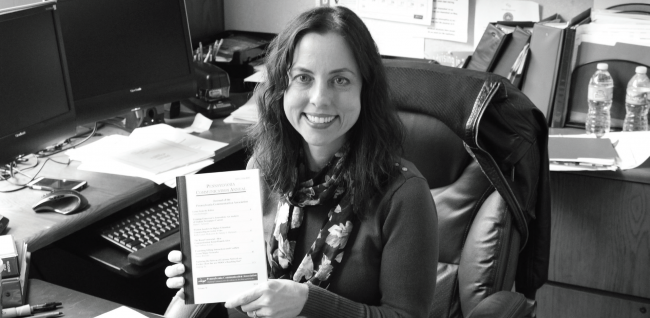

Photo Credit / Eric Kump
By Eric Kump
SC Staff Writer
This past September, Kelly McKenzie, instructor of Academic Enrichment and Learning and the adviser to undeclared majors at East Stroudsburg University of Pennsylvania co-authored an article in the Pennsylvania Communication Annual.
Her drive for the article was always there, she said, “I was always attending women’s rights marches and supported the issues surrounding women.”
She continued, “One of the greatest influences I have is a previous professor to ESU, Molly Whalen.”
McKenzie’s co-authored article took her about three years to complete while studying at Franklin & Marshall College. Here, she took a course focusing on women’s studies. This led to a series of presentations which required her to interview six women about their careers and the hardships they found in the upper level positions.
McKenzie said, “People liked their stories and students were in disbelief.”
She continued, “It was an eye-opening experience.”
The women spoke about men’s style of leadership and in what ways it is similar to their own. She found that some women believe they must act with more masculinity in their leadership style in order to be seen as a figure of authority.
Another topic that this study has highlighted is that some men have an immediate confidence in their words while women are more considerate and carefully choose their words. Instead of coming up with ideas and simply announcing them, some women in these high positions feel that they must make a case for their points of view. In the same instance, a man might have an idea and simply say it.
This leads to another area of interest; women’s credibility. Many women wished that they had an inherent credibility because of their position. Currently, some feel the need to prove that they have this credibility that many people accept without question from a man.
Mackenzie considers this another example of microaggressions against women in positions of higher standing. Microaggressions are daily verbal, behavioral, or environmental, indignities whether intentional or unintentional, that communicate a hostile, derogatory, slight toward someone.
The last thing she discussed about her studies is that women with children in these upper level positions are generally categorized as gender plus in a negative response.
“Gender plus is a big thing for me,” said McKenzie, “I want to continue with more research on this, questioning both men and women on how they feel about parents in the workplace.” One of the questions raised is if people feel the women can devote all of their time to work if the mother has a sick child at home.
After the impact these studies made here, McKenzie continued them further in Guadalajara, Mexico and interviewed fifteen female heads in the company Hewlett Packard (HP).
The interviewees of this research were very different from the women of American culture. “The jobs they have are not stationary so, they need to be very flexible.” McKenzie said, “After about two years, their positions shift. This gave me a view of what it is like in an international company.”
In general, the women that were interviewed explained that their role models are the female leaders of America but they feel that neither men nor women of the country know what it means to have a relationship with their employees. These women feel it is necessary to have a relationship with their coworkers because it increases efficacy of the group work.
Women from HP said that the leadership style of women in America is similar to that of men. McKenzie also found that it is believed by some that the leadership style of European women is similar to that of American women. This commonality is in the aggressiveness of the leadership style and that it is task or goal oriented.
McKenzie plans to take all of the information she gathered from Guadalajara and place it into another article after completing her dissertation for her doctorate.
In addition to these accomplishments, she has also already been published in the College Reading and Learning Association on another piece she co-authored about the effect of tutoring on undeclared students. She plans to conduct studies on tutoring regarding what works well and different methods that help students learn more effectively.
For more information on the article contact Kelly McKenzie at 570-422-3741 or kmckenzie@esu.edu.
Email Eric at:
ekump@live.esu.edu
